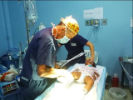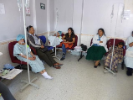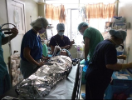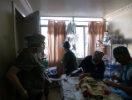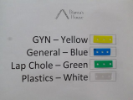Going Global: A Study Abroad Q&A with a Nursing Student
FEATURED ARTICLE | NOVEMBER 22, 2016 | BY JULIE ZILNICKI, UB SON DNP STUDENT
Julie Zilnicki, a UB SON DNP student studying to become a nurse anesthetist, explains study abroad and shares her own experiences in Greece and Ecuador.
Q: Study abroad – we’ve all heard of it, but what does it entail?
A: It’s pretty simple: study abroad means a student travels to a foreign country and is enrolled in college-level classes at a university in that country for course credit.
Every program is different, giving students many options to best fit their educational and financial needs. Some programs are offered directly through a student’s home university, whereas others are available through an outside university. For example, students attending the University at Buffalo can easily attend any study abroad program offered by any of the SUNY schools.
Q: So what’s the difference between “study abroad” and “service learning”?
Service learning is typically shorter in duration – it is often a more viable option for students in rigorous programs (read: nursing students). These opportunities are offered by universities and not-for-profit organizations. Typically, these programs are not for credit. (Important to note: students are still responsible for the cost of travel, housing accommodation and food on service trips. Many students believe that because they are volunteering their services, costs will be covered; however, this is not the case. For a week-long trip, students may expect to pay $1,000-$2,000.)
Q: Why are service learning and global opportunities so important for nursing students?
The world is becoming a “global market” and the US is becoming a more diverse country than ever before. Nurses (and nursing students) will be taking care of patients and families in a very intimate setting. It is important for students to be aware of and sensitive to foreign cultures, customs and languages. This makes studying abroad and foreign service projects an invaluable experience.
Many students report that they have learned how to be accepting of different lifestyles and mannerisms, how to communicate better with people who speak a different language, and how to be a more accepting human being. Some programs house students together while others place students with a host family. Living with a host family in combination with talking courses with local students of the host nation fosters a learning environment where American students can overcome stereotypes of certain cultures by directly interacting with the nation’s citizens and encouraging accepting relationships. Students also often talk about their fun and enlightening experiences of actively participating in cultural rituals – it is truly a once-in-a-lifetime opportunity.
Q: Can you describe your experience with studying abroad?
I have had the great fortune of being able to travel abroad a few times. In Fall of 2010, I was able to study abroad in Athens, Greece, and in September 2013 and 2014, I was able to travel to Ecuador for a week-long surgical mission through a nonprofit organization, Blanca’s House.
One of the most important reasons I chose to study in Greece was it fit my budget – another reason is I took seven years of Latin and Ancient Greek before college and I thought it would be a great opportunity to expand on my knowledge. It was a phenomenal experience. I was able to learn basic conversational Greek language and Greek customs. Most of the classes I took were unrelated to nursing/science, but I found great professional and educational value in expanding my global perspective and cultural competence (which is very important for nurses).
My favorite course was “The Ambassadors Forum” – ambassadors to Greece spoke to the class about global topics like their home country’s relationship with Greece, global economics and the European Union. I also travelled to many historical sites in Greece and surrounding countries.
This experience expanded my appreciation for the luxuries we have in the United States and gave me a better understanding of what life is truly like for some of my patients who have come from other nations and cultures.

Athens, Greece. Studying abroad is a great opportunity to explore foreign countries and cultures.
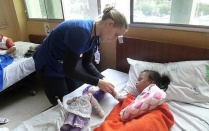
In Ecuador, Julie worked with Blanca's House, a volunteer organization that brings free medical services and health care education to Latin American countries.
After obtaining my BSN, I traveled to Ecuador for a week-long surgical mission. Through Blanca’s House, we performed almost 100 surgeries in four days on patients that otherwise could not afford these life-changing procedures.
This experience was truly eye-opening. It made me cherish the equipment and supplies in U.S. hospitals because the two hospitals we served had very primitive facilities and equipment. It was also a very humbling experience – the patients we took care of were extremely grateful for the services provided. I felt as though I really made a difference in their lives.
Interested in an adventure? Here is a sample of study abroad opportunities to explore!
Through the University at Buffalo
Other great organizations
Comments
What a great article Julie! Service learning is definitely a must while in school or post school. You were a great nursing preceptor of mine in the MICU while at Roswell. Your international abroad experience transcends as a nurse while you were precepting me! :)
-Alexander Salinas









